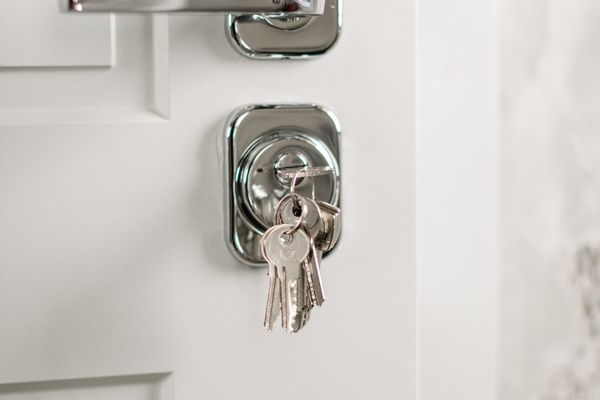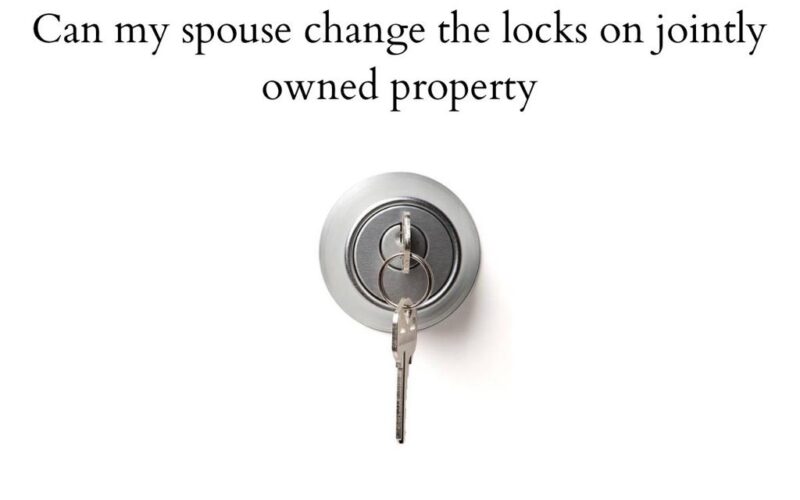Many Persons tend to ask the question “Can my spouse change the locks on a jointly owned property”. Yes they can, this article will be focused on the rights of spouses regarding jointly owned properties, how and when to legally restrict any partner from gaining access to a jointly owned property, and what to do if you, as a husband or wife, are locked out of your matrimonial home or jointly owned property.
It would also guide you in deciding to separate from your husband or wife and understand better what happens to the marital home during separation.
Now in answering the question, “Can my spouse change the locks on a jointly owned property?”
Can my spouse change the locks on jointly owned property?
Yes, it is not illegal to change the locks on a home that you own. Notwithstanding, if you and your spouse jointly own the house, it is still not considered illegal for them to change the locks. You are not to deny the other spouse access to occupy their home, and in such a situation, reversing the waves might be repetitive.

When can I change the locks on my husband or wife?
In answering the question, “can my spouse change the locks on a jointly owned property” you need to understand when your partner has the right to change the locks and how your spouse can go about it.
How a spouse goes about gaining exclusive access to a jointly owned property and effectively restricting the other spouse’s access to occupy will depend on the reasons for wanting exclusivity to occupy a property.
These reasons are subject to whether the spouse is non-violent or violent and if there’s a pending divorce or separation.
How to remove a non-violent spouse.
The urge to restrict a spouse from having unauthorized access to your home even when he is not violent stems mainly from wanting privacy, avoiding drama, or taking items from your home. If you are under this category, you should ask for temporary orders.
Temporary orders determine how parties will manage their affairs pending divorce: When the parties will see their children, who will pay which bills, and who will get to continue living in the marital home.
This order is, however, difficult to attain, as courts are not likely to force one party out of their home unless a legitimate reason is given, like a threat to life or domestic violence, and if no affordable or comfortable living arrangement is provided for the other spouse.
If one party voluntarily moves out, the court would ensure that the spouses can incur additional costs and expenses. However, if there happens to be a financial constraint or other circumstances, it is often impractical for parties to physically separate even if they want to.
In such situations, the court will not impose that the other party stays apart, and you will have to wait to change the locks until the divorce is finalized or the court temporarily awards you exclusive use of the home.

How to remove a violent or harassing spouse
You can seek a restraining order if there’s a threat to life or abuse and you harbor a fear of living with your spouse.
A restraining order is granted when proof of violence or threat of violence is shown. The restraining order will not be granted if such violence or threat is yet to occur.
If you succeed in getting a restraining order, your spouse will be prohibited from having physical contact with you or showing up at your home. The restraining order has two types, Temporary and Permanent, and each has a different validity period.
What to do if a spouse locks you out of your house
In understanding that your spouse cannot lock you out of a jointly owned property if your spouse has locked you out of your home without a court’s authorization, they are acting illegally.
If you happen to find yourself in a situation where your spouse has denied you access to your home, either as a husband or wife, you can report to the police or get a family attorney to seek legal redress against such spouse.
When informing the police and the authorities, they would intervene by asking your spouse for a court order granting an exclusive right to occupy the home. Until that is obtained from the court, access must be given to the denied spouse.
If, after reporting to the police and their action persists, the next step is to take on a Family attorney and seek redress in a court of law.
You may want to return to your home and bang on the door or stand outside and call the police; the best option is to notify the court of the situation.
Handling the problem in this manner would be helpful in two ways. For example, first, an emergency petition will get you back into the house quickly and legally, and second, it would act as proof to the court that your spouse may not be willing to abide by the rules during the divorce process.

What are my rights if I am locked out of my home
There are several existing rights for a spouse that has been locked out of his home or intends to move out. What are your requests if you happen to be caught in this situation?
You have to understand that so far as the property is jointly owned, each spouse is permitted to enter that property without restrictions. This also applies even when one of you voluntarily moves out after separation.
You also have to understand that in claiming rights, some rights depend on whether a spouse is legally married or if the couple is separated.
A separated or divorced spouse’s rights
Firstly, when one spouse moves out voluntarily or as a result of separation, the ex-partner’s right to privacy needs to be respected. As such, having access to the house is based on informing the other spouse. If this is not done, such a spouse can attract criminal sanctions for disturbance of the peace.
Secondly, changing the locks will not prevent your spouse or ex-spouse from entering the house, as the property is jointly owned. However, they are limitations to that, and if a court order is granted to restrict access, then such an order must be followed.
Thirdly, leaving the property will not prohibit you from having the right to have an equal share of the house in a divorce settlement. There are many financial claims a separated spouse can make during divorce, including the sale and alienation of the home.
These claims are available whether or not the marital assets are owned jointly or in one spouse’s name, and the claims do not depend upon whether you are physically living in the family home.








